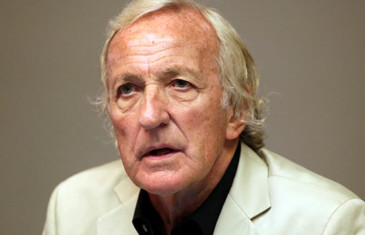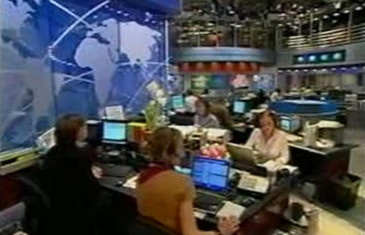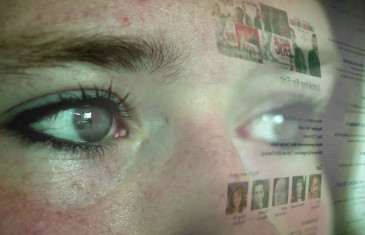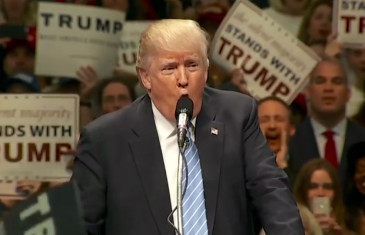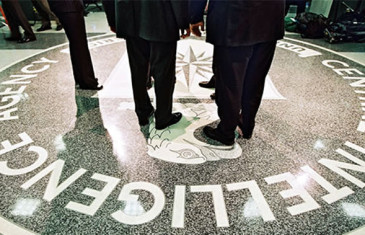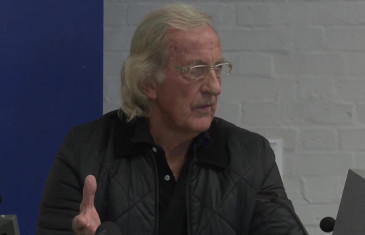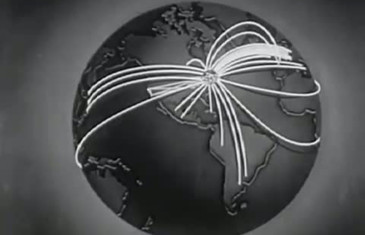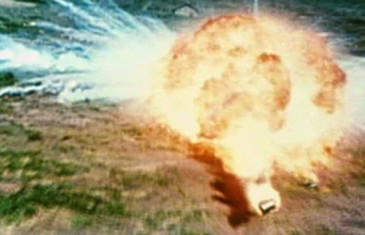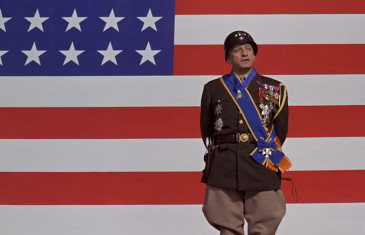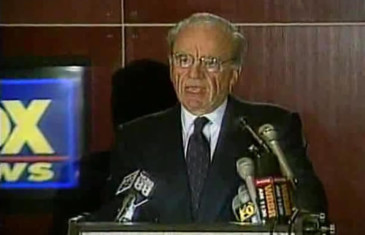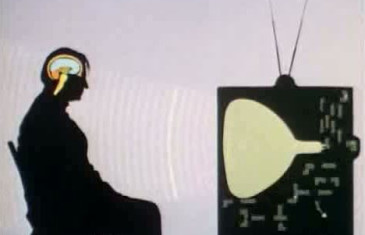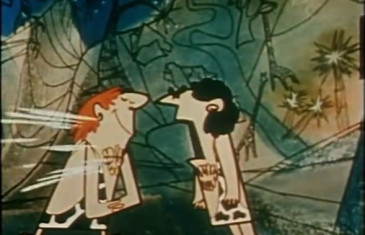Search Results
Renowned independent journalist John Pilger speaks about complicity and compliance, censorship and citizen journalism as well as issues such as the holocaust in Iraq and Kevin Rudd’s shrewd political apology to the Indigenous peoples of Australia as Prime Minister. “These days, a one-dimensional political culture ensures that few writers write, or speak out, as they did in the last century. They are talented, yet safe. In the media, the more people watch, the less people know. Beneath the smokescreen of objectivity and impartiality, media establishments too often ventriloquise the official line, falling silent at the sight of unpleasant truths.”
By providing a striking comparison of U.S. and international media coverage of the crisis in the Middle East, Peace, Propaganda and The Promised Land zeros in on how structural distortions in U.S. media coverage have reinforced false perceptions of the Israeli-Palestinian conflict and how, through the use of language, framing and the context of the Israeli occupation of the West Bank and Gaza remains hidden in the news media…
How does one sell a war? This was a question that weighed heavy on the minds of those in the United States government long before the invasion even started. Operation Saddam: America’s Propaganda Battle takes a look at the marketing of war -– a cocktail of distortion, lies and forgeries -– as shown by former secret service agent Ray McGovern, American investigative journalist Seymour Hersh and best-selling author John MacArthur, presenting the individual stages of the propaganda battle, by which American, British and other governments sought to justify the second invasion of Iraq…
Misogyny is rampant in this culture, and corporations capitalise on making women hate their bodies. Indeed all aspects of womanhood are commodified, hypersexualised, and squeezed into gender stereotypes. Being female comes at a cost. So it’s no wonder that young people growing up can feel horrible about themselves and their bodies, and further feel confused about what it means to be a woman in today’s world. Into this perfect storm steps queer theory, an ideology born in the 1990s, that tells people that all the confusing feelings they may experience about the world they live in can be fixed not by changing the world, but by changing themselves. The past decade has seen a steep rise in the number of young girls seeking to alter their bodies by undergoing life threatening, irreversible procedures. Dysphoric is a series that explores this concept of gender transition, told through the voices of clinicians, psychiatrists, sociologists, feminists, academics, detransitioners, and concerned citizens and parents. The series also discusses the permanent medical side-effects of hormones and surgeries, the propaganda of corporations that glorify thousands of stereotypical gender presentations coalesced as fashion, the surge in pronoun policing, censorship and the curtailment of speech, language hijacking that calls women “menstruators,” and the many other hurdles women face while trying to question this modern-day misogyny.
A Thousand Cuts is a timely film about modern-day journalism and freedom of the press inside the Philippines where the political space has been usurped by social media disinformation campaigns, celebrity propaganda spectacle, and direct organised political violence. The film comes as the world awaits the verdict of the case against of Maria Ressa, the CEO and founder of the news network Rappler, who has been vocal about holding president Rodrigo Duterte accountable for his government’s much-criticised and violent “war on drugs.” In what is a salient trend of our time, A Thousand Cuts examines the disinformation campaigns and the crackdown on the media, while journalists Maria Ressa and her team place the tools of their trade–and their freedom–on the line in defence of truth and democracy.
The Facebook Dilemma aims to open an in-depth investigation into the impact Facebook has had on privacy and democracy in the United States and throughout the world, by revealing how the decisions made by the company as it sought increased wealth and new users, transformed it into a vast surveillance machine, a media company, and a ‘hidden hand’ in elections and political discourse. Drawing on original interviews from those inside the company, this two part series catalogues some of the ignored warning signs, both inside and outside the company, of Facebook’s negative impact, growing from Zuckerberg’s dorm-room project and into a powerful global empire.
Tracing the Internet’s history as a publicly-funded government project in the 1960s, to its full-scale commercialisation today, Digital Disconnect shows how the Internet’s so-called “democratising potential” has been radically compromised by the logic of capitalism, and the unaccountable power of a handful of telecom and tech monopolies. Based on the acclaimed book by media scholar Robert McChesney, the film examines the ongoing attack on the concept of net neutrality by telecom monopolies such as Comcast and Verizon, explores how internet giants like Facebook and Google have amassed huge profits by surreptitiously collecting our personal data and selling it to advertisers, and shows how these monopolies have routinely colluded with the national security state to advance covert mass surveillance programs. We also see how the rise of social media as a leading information source is working to isolate people into ideological information bubbles and elevate propaganda at the expense of real journalism. But while most debates about the Internet focus on issues like the personal impact of Internet-addiction or the rampant data-mining practices of companies like Facebook, Digital Disconnect digs deeper to show how capitalism itself turns the Internet against democracy. The result is an indispensable resource for helping viewers make sense of a technological revolution that has radically transformed virtually aspect of human communication.
The Great White Hoax contextualises the current day politicking in the United States, with a primary focus on Donald Trump’s race-baiting 2016 campaign for president. The film also widens scope however to show how Trump’s charged rhetoric fits into a long-standing historical pattern in politics in the United States, offering a stunning survey of how racism and racial scapegoating have shaped American politics for centuries. The film becomes a solid resource for a basis on race relations, white privilege, the intersectionality of race, class, and gender identities, presidential politics, and political propaganda in the age of “social media.”
Counter-Intelligence is a 5 part series that explores in-depth, the vast, sprawling and secret National Security State that operates throughout the United States–and indeed the world. The series examines the foundations of the Military-Industrial-Intelligence Complex, charting through to the myriad consequences in today’s world where secret intelligence organisations continue to hijack governments, manipulate elections and commit heinous crimes against humanity–all under the cloak of “National Security”. In the wake of the continued revelations of the NSA PRISM program, this series is now more important than ever to provide a solid historical context to the workings of the rapacious and ever-expanding National Security State…
Esc & Ctrl is an online series of short documentary films where journalist and filmmaker Jon Ronson explores some aspects of screen culture and the Internet. By exemplifying the concepts of control of information and the screen culture’s reactions to publishing, censorship, viral videos, media attention and manipulation; a small set of stories weave together to pose bigger questions around democracy and open communication in the age of the computers and a corporately mediated virtual world.
John Pilger talks about the various mainstream media commonalities of today–censorship by omission, information management, Public Relations and the ‘massaging of information’, as well as the clever distractions such as the election of Obama as a war monger in the land of slavery, alongside figures such as Hillary Clinton and Julia Gillard as a false win for so-called ‘feminist ideals.’ Amongst the ongoing wars played by the United States, Britain and Australia, Media And War — Challenging The Consensus is a renewed call to unravel complex propaganda and cut through distractions.
The Power Principle is a series of films examining the history of the United States and the building of its empire with particular emphasis on the last seventy years of United States foreign policy. The methods that make empire possible are also examined—the politics of fear, the rise of public relations, the ‘Mafia Principle’ and the reoccurring use of fabled enemies, contrasting the Soviet Union and the Cold War alongside the parallels of today with the “War On Terror”. Not only does The Power Principle tie together historical events to revive a common thread, the series may also encourage viewers to reconsider their understanding of historical events and the portrayal of them, showing how those in power play a role in manipulating the collective memory through generations.
Psywar explores the history and evolution of propaganda along with the rise of ‘public relations’ with an emphasis on the relationship between war, propaganda and privilege…
The War You Don’t See traces the history of ’embedded’ and independent reporting from the carnage of World War One to the destruction of Hiroshima, and from the invasion of Vietnam to the current war in Afghanistan and disaster in Iraq. As weapons and propaganda become even more sophisticated, the nature of war is developing into an ‘electronic battlefield’ in which journalists play a key role, and civilians are the victims. But who is the real enemy?
Corporations On Trial is a five-part series following just some of the many lawsuits being brought against multinational corporations for war crimes, conspiracy, corruption, assassinations, environmental devastation and payments to terrorists. Such serious charges have forced some of the world’s largest companies to hire high-profile defence lawyers to protect public relations in cases often brought by plaintiffs who are barely literate. These five films reveal a growing anxiety about the power and influence of big business, as many multinational corporations have annual revenues greater than some countries’ national budgets and indeed increasingly hold governments to ransom by their economic power. Around the world, ordinary people are fighting back and asking how many more times their interests should be sacrificed for corporate greed and shareholder profit…
Militainment Inc. examines how news coverage of war in the United States has come to resemble Hollywood film, video games, and reality television in its portrayal of war as entertainment. Using a range of media examples–from news anchors’ idolatry of military machinery to the impact of government propaganda on war reporting–Militainment Inc. asks: How has war taken its place as a spectacle of entertainment? And how does presenting war as entertainment affect the ability of the population to evaluate the real human costs of this culture’s military-industrial-complex?
The untold history of The Project for the New American Century is no more. This film exposes how every major war in US history was based on a complete fraud with video of insiders themselves admitting it. This documentary shows how the first film theatres in the US were used over a hundred years ago to broadcast propaganda to rile the American people into the Spanish-American War; the white papers of the oil company Unocal which called for the creation of a pipeline through Afghanistan and how their exact needs were fulfilled through the US invasion of Afghanistan; how Halliburton under their “cost plus” exclusive contract with the US Government went on a mad dash spending spree akin to something out of the movie Brewster’s Millions…
The Virgin Trade investigates the growing phenomenon of Western sex tourism, with a focus on Thailand. The film travels through red light districts and the starry-eyed advertising propaganda that targets Western men to reveal the mechanics of the sex industry as it operates throughout Asia. What is revealed is a world entangled by money which leads to abuse, demand which perpetuates the culture, consumerism which drives demand, and poverty which drives the need. What happens when countries and cultures are ravished like this with Western sex tourism? Are parents selling their children into brothels to finance lavish Western lifestyles? Or do orphans fill the demand–smuggled into prostitution after disasters like the tsunami of 2004? The Virgin Trade dangles the questions of numbers while still affirming widespread exploitation and deceit. The interconnectedness, scale and depth of the problem, as well as what is still hidden or left unsaid, is left up to the viewer…
The Pentagon has a long tradition of cooperation with Hollywood. Movie studios can save millions of dollars and achieve spectacular success by securing use of military stock footage, military equipment, weapons and manpower. But the catch is that Hollywood must alter scripts, whitewash history, censor and present their films to display war and the military in a favourable way. As a consequence, mainstream commercial films become the best and most powerful, widespread propaganda…
The global growth of Rupert Murdoch’s media enterprise is cause for concern. The concentration of media ownership on a global scale in the hands of one man infringes on the freedom of the press by definition at the very least. But the real life example here is Fox News and it’s own claim of being “Fair and Balanced” — one only has to look at the coverage of the invasion of Iraq for example, or “commentators” such as Bill O’Reilly or Sean Hannity and the interactions they have with their “guests”; the vast political connections between Fox News, the Whitehouse and the Pentagon propaganda unit; the suppressed news stories, the censorship, the manipulation and control over the “news” by Murdoch and the president Roger Ailes themselves, not to mention the control over reporters, with former journalists alleging that Fox News asked them to lie and when they refused they were fired. Even lawsuits entailed from this with the court ruling that it is not against the law to lie on a news program…
The Secret Government, as its title suggests, is essentially an investigation into the processes, plans, operations and persons responsible for systemic abuses of power at senior levels of the United States government during the 1980s. The film covers multiple covert operations and secret projects, but takes a particular focus on the Iran–Contra affair of 1986, where Ronald Regan secretly facilitated the illegal sale of arms to Iran—which was the subject of an arms embargo at the time—to support a right-wing terrorist group called “The Contras,” and also make obscene profits from the sale of such weapons. Transported to the political happenings of today, The Secret Government is a call to remember history, and see that mass profits from weapons dealing running covert/secret wars were a reality then, and now, as well as to reveal just how far institutionalised propaganda and obfuscation works to conceal these home truths, still generations later.
When the United States devastated Hiroshima and Nagasaki with nuclear weapons in 1945, the bombs dropped were code-named ‘Fat Man’ and ‘Little Boy’ — as part of the new propaganda campaign to create acceptable images of war, propagating the illusion that the world should live securely with nuclear weapons, and that it is the only way to ‘enable peace’. By using reassuring and even soothing language, this new kind of propaganda spread all over the world…
